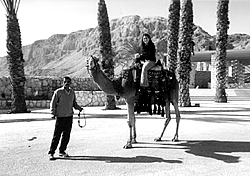

As Oberlin students converge for classes the common inquiry is what everyone did during Winter Term.
Experiences range from studying or volunteering on-campus to venturing across the world, with each person's tale different from the next.
First-year Kristian Whitsett, for example, spent January in Mexico.
"My plan was to study Spanish but I did not want to do the school trip because it was fairly expensive, and they stayed in Guadalajara and I wanted to travel around."
He and a friend went to Guadalajara and Puerto Vallarta for a few days each but found Puerto Vallarta to be too much of a tourist attraction, with a Planet Hollywood and "awful American commercial stuff," he said. So, the two settled in Mazatlan, a fishing and industrial town, for two weeks, taking classes every morning at schools where they are offered in one-week increments.
"I wanted to experience more of the culture," Whitsett said. "It was worth it. I hated Spanish in high school. Now I want to learn Spanish because you go down there and it's a challenge to live and try to find your way around and travel, and it gave me a reason to study.
Whitsett added, "It was good for me because I got a ton of different books and can study on my own now that I'm back here."
First-year Shira Schwartz also travelled abroad, but her program, an archaeological dig in Israel, was organized by the University of Hartford and Hebrew University. The dig took place in Ein Gedi, a large village near the Dead Sea, where her group of nine excavated a house. One hundred volunteers from across the world also took part in the program.

The excavating entailed being in a square with a partner and using a pickax, a bucket and some brushes while digging, she said.
On the first day of the dig, however, Schwartz said she accidentally threw away a coin. Thinking that it was simply a rock, she tossed it. It was only when another group member's strikingly similar discovery was marveled at that she realized what had happened. And the only other person she told was her partner.
Schwartz also traveled throughout Israel, examining sites. She was joined by famous Israeli archaeologists, including the professor who led her group.
"The most important thing that my professor taught us is to be very skeptical of archaeology and to question everything you read and see," she said.
"It was really interesting. The most interesting items I found were coins and pottery shards." Schwartz's digging partner found an ancient oven. "It's very tedious work and at times boring. Some days are better than others," she said.
In addition to the digging, for which Schwartz arose at 5:45 a.m. and worked for eight hours per day, she took classes on field methodology and archaeology during the three week project. She spent two additional weeks in Israel traveling and hanging out with family.
"It was really cool. I'm glad I did it," Schwartz said.
For four weeks, junior Emily Aronow-Frieden and first-year Renee Timberlake lived and studied across the country at the Center for Regenerative Studies at California State Polytechnic University in Pomona, California.
Aronow-Frieden describes the Center as "a little oasis of nature outside of L.A." with ponds, one of the few remaining wetlands in California and agricultural fields.
Faculty members as well as students live there and both study and participate in sustainable living. Twenty students, ranging in age from undergraduate to those pursuing their master's degrees, took classes about such topics as leadership, communities and natural landscapes .
Aronow-Frieden said that the Center recycles everything, using solar power and its own ponds to water the agriculture, for example. Its goal is to be a self-sufficient community, producing no waste. She recalled going up to a rooftop to gather vegetables for salad.
Aronow-Frieden had such a positive experience that she said, "I almost didn't come back here this semester. I highly recommend for everyone to go there, especially if they've never planted anything in their lives," she said.
Aronow-Frieden discovered the project through the Environmental Studies department.
Nine students and professor of African-American Studies James Millette traveled to Trinidad and Tobago to study the politics and economics of Trinidad. Students were based at the University of the West Indies.
Sophomore Raven Taylor said, "We attended lectures three times a week and got the chance to speak with different guest speakers and with prominent men and women of the country. This trip made us realize how wonderful a man that Professor Millette is."
"We felt a general warmth from all of the people. We were able to see elementary school children and eat roti and have different dishes," added Taylor.
The elementary school students at a government school for boys were particuarly taken with the American visitors. Oberlin students spoke to the boys, who reciprocated by offering a song and steel drum performance. Milette then treated the young students to an inspirational speech.
Some Trinidadians were inspired by dreams of a brush with fame. A group of children chased the Oberlin students, thinking they were members of a band. The Obies escaped the autograph hounds by taking advantage of an escape route offered by some helpful fifth-graders.
The group spent a week in Tobago, Trinidad's twin island. Sophomore Camalo Gaskin said the schedule relaxed in Tobago.
"There were palm trees everywhere, and fruits growing out in the yard," Taylor said.
Riding in style: First-year Shira Schwartz sits atop a camel she rode while in Israel over Winter Term. Schwartz spent the month working on an archaeological dig organized by the University of Hartford and by Hebron University. (photo courtesy of Shira Schwartz)
Copyright © 1998, The Oberlin Review.
Volume 126, Number 13, February 6, 1998
Contact us with your comments and suggestions.